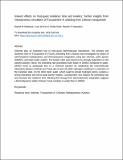| dc.contributor.author | Shadrack, Daniel | |
| dc.contributor.author | Kiruri, Lucy | |
| dc.contributor.author | Swai, Hulda | |
| dc.contributor.author | Nyandoro, Stephen | |
| dc.date.accessioned | 2023-09-18T12:55:50Z | |
| dc.date.available | 2023-09-18T12:55:50Z | |
| dc.date.issued | 2021-04-14 | |
| dc.identifier.uri | https://doi.org/10.1007/s00894-021-04735-y | |
| dc.identifier.uri | https://dspace.nm-aist.ac.tz/handle/20.500.12479/2021 | |
| dc.description | This research article was published in the Journal of Molecular Modeling Volume 27, 2021 | en_US |
| dc.description.abstract | Solvents play an important role in host-guest intermolecular interactions. The kinetics and residence time of Toussaintine-A (TouA) unbinding from chitosan was investigated by means of well-tempered metadynamics and thermodynamic integration using two solvents, polar aprotic (DMSO), and polar protic (water). The kinetic rates were found to be strongly dependent on the solvent polarity; hence, the unbinding rate proceeded much faster in DMSO compared to water. DMSO tends to participate less in a chemical reaction by weakening the intermolecular interaction between chitosan and TouA due to lack of acidic hydrogen resulting in a reduction of the transition state. On the other hand, water, which ought to donate hydrogen atoms, sustains a strong interaction and hence large barrier heights. Consequently, this reduces the unbinding rate and increases the residence time. Binding free energy from thermodynamic integration suggests a thermodynamic stable chitosan-TouA complex in water than in DMSO. | en_US |
| dc.language.iso | en | en_US |
| dc.publisher | Springer Nature | en_US |
| dc.subject | Toussaintine-A | en_US |
| dc.subject | Metadynamics | en_US |
| dc.subject | Solvents | en_US |
| dc.title | Solvent effects on host-guest residence time and kinetics: further insights from metadynamics simulation of Toussaintine-A unbiding from chitosan nanoparticle | en_US |
| dc.type | Article | en_US |

